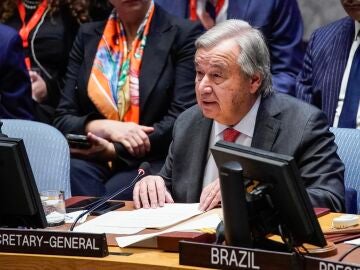
Israel has entered into an open crisis with the UN, with calls for the resignation of Secretary General António Guterres, while the international community is unable to reach a minimum international consensus on the war in Gaza.
He UN Security Council held this Tuesday an open debate on the situation in Gaza and 86 speakers had signed up for the program, from countries and regional groups – among them more than 20 ministers – an example of how the Palestinian conflict has returned to the center of world geopolitics. .
It was at the beginning of the session when the secretary António Guterres took the floor and said: “The Hamas attacks (on October 7) do not come from nowhere: the Palestinian people have been subjected to 56 years of suffocating occupation.”
Those words motivated anger of the Israeli ambassador to the UN, Gilad Erdan, who on his
Next, Israeli Foreign Minister Eli Cohen announced that he was canceling a meeting he had scheduled with Guterres and a group of relatives of the Hamas hostages, and told reporters, regarding Guterres: “Aren’t you ashamed?”, adding that “of course” he supported the call for his resignation.
Erdan then said that his country will be forced to “reconsider” its relationship with the UN: “We have been complaining for a long time about how the UN and its representatives act in Israel, distorting reality. They do not report what is really happening, “They take things out of context, they refuse to verify our reports of terrorist attacks (…) and they take Hamas’ words as if they were the word of God,” Erdan complained.
The utopia of a consensual resolution
The Council session was a “open debate” where each country presents its positionbut it served to make the US Secretary of State, Antony Blinken, announce that his country now supports “humanitarian pauses” that allow food, water and medicine to be brought into Gaza (he did not mention fuel), and that this will be the substance of the next resolution it presents to the Council.
The allusion to Russia and China did not like the “humanitarian pauses” and not the “ceasefire”: the Russian ambassador has already warned that he will oppose this resolution (and has the right to veto), and that he will present another alternative in its place; China’s, for its part, said that less convoluted language would be desirable for what the international community demands: an immediate ceasefire.
On Monday, The US has already said why it does not support the ceasefire: first, because it will help Hamas to rearm, and then, in the words of Joe Biden himself, because Israel cannot be asked to stop the attacks while 220 of its hostages remain in the hands of Hamas.
In this way, the United States resolution will once again remain a dead letter, as it will be vetoed by at least Russia, and will thus be the third resolution that fails in the Security Council on the war in Gaza, showing once again the ineffectiveness of the ONU.
Jordanian Foreign Minister Ayman Safadi, also present this Tuesday in New York, said that the Security Council is failing in its historical responsibilities, and warned that Arab countries, and Muslims in general, are increasingly angry over what they see as “support” for Israel from a large part of Western countries.
And as if echoing his words, shortly afterwards Israel’s Foreign Ministry spokesman, Lior Haiat, told reporters: “Today there is no middle ground: if you don’t support Israel, you are a supporter of Hamas.”
Source: Lasexta
Ricardo is a renowned author and journalist, known for his exceptional writing on top-news stories. He currently works as a writer at the 247 News Agency, where he is known for his ability to deliver breaking news and insightful analysis on the most pressing issues of the day.












